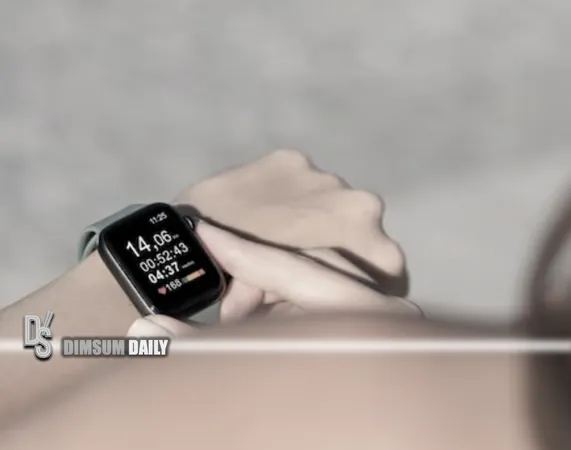
Shocking Revelations: Step Count Accuracy of Smart Watches Plummets to 74% Deviations!
2025-05-15
Author: Yu
In a startling turn of events, a report from the Consumer Council has raised alarm bells regarding the accuracy of popular smart watches and fitness trackers. These devices, adored by health enthusiasts, may not be as reliable as consumers assume. The report, stemming from tests conducted by the International Consumer Research and Testing (ICRT), revealed that 44 models sold in Hong Kong displayed shocking discrepancies in data performance.
The study scrutinized 38 smart watches ranging in price from HK$199 to HK$9,799, alongside six fitness trackers that cost between HK$139 and HK$498. Evaluations took place in a European lab, where assessors wore each device while engaged in various activities, including walking, running, and cycling, comparing the results to high-precision tools.
Diving into the findings, the report disclosed that three models from the same brand exhibited a jaw-dropping step count deviation of 59% to 74% during typical daily activities. Although most devices fared well during controlled walking and running tests—with deviations remaining under 7%—the inaccuracies in real-world scenarios are alarming.
Heart rate monitoring wasn't spared from scrutiny either. While half of the tested smart watches showed deviations of 7.5% or less, two models alarmingly surpassed 11%, with deviations reaching over 21% during cycling. One fitness tracker mirrored this issue, showcasing inaccuracies above 11%. Blood oxygen measurement results reflected varying performance, with some models hitting near-perfect metrics, while others suffered catastrophic failures.
The report also delved into vital features like GPS accuracy, battery life, and smart functionalities. Devices featuring GPS generally performed decently in distance tracking, averaging a 4.3% deviation, but those without GPS were far less reliable, hitting staggering deviations of up to 34.3%. Battery longevity ranged dramatically, with some devices enduring over 20 days on a single charge, while others required frequent charging every 1.5 to 2.2 days.
Evaluating smart features like call capabilities and notifications, the report noted that of the 38 watches studied, 23 could handle hands-free calls with built-in microphones and speakers. Those lacking such features were penalized on functionality ratings. Durability was a concern, too—one smart watch shattered its screen after just a few drops from a height of 0.8 meters.
The test unveiled that many models exhibited serious errors in accurately measuring fitness and health metrics, including step counts and heart rates. Eleven smart watches and a single fitness band broke through with a top score of 5 in data accuracy, with Garmin leading the charge.
In the overall performance category—including fitness data accuracy, smart capabilities, and battery life—15 smart watches earned a remarkable score of 4.5. Notable names in this elite group included the Apple Watch Series 10 GPS, Garmin Forerunner 955, and Google Pixel Watch 3.
When it comes to price, the Garmin Fenix 8 AMOLED stands out at HK$9,799 as the costliest, while the budget-friendly Amazfit Active comes in at just HK$1,098—a staggering difference of HK$8,700!
On the other hand, the Xiaomi Smart Band 9 Pro emerged dominant in the fitness band sector, scoring 4.5 due to excellent heart rate measurement and battery life. Other commendable models scored between 3.5 and 4.
In light of these revelations, the Consumer Council underscores that the data from these devices should be perceived as estimates rather than definitive measurements, rendering them unsuitable for medical use. They strongly urge manufacturers to refine their designs and boost the quality of their products to enhance accuracy.
Consumers, take note! It's crucial to compare models wisely based on your needs, prioritizing features like robust battery life and hands-free calling capabilities. Make sure to wear your devices properly for accurate measurements, and don’t forget regular software updates and password changes to protect your data.


 Brasil (PT)
Brasil (PT)
 Canada (EN)
Canada (EN)
 Chile (ES)
Chile (ES)
 Česko (CS)
Česko (CS)
 대한민국 (KO)
대한민국 (KO)
 España (ES)
España (ES)
 France (FR)
France (FR)
 Hong Kong (EN)
Hong Kong (EN)
 Italia (IT)
Italia (IT)
 日本 (JA)
日本 (JA)
 Magyarország (HU)
Magyarország (HU)
 Norge (NO)
Norge (NO)
 Polska (PL)
Polska (PL)
 Schweiz (DE)
Schweiz (DE)
 Singapore (EN)
Singapore (EN)
 Sverige (SV)
Sverige (SV)
 Suomi (FI)
Suomi (FI)
 Türkiye (TR)
Türkiye (TR)
 الإمارات العربية المتحدة (AR)
الإمارات العربية المتحدة (AR)